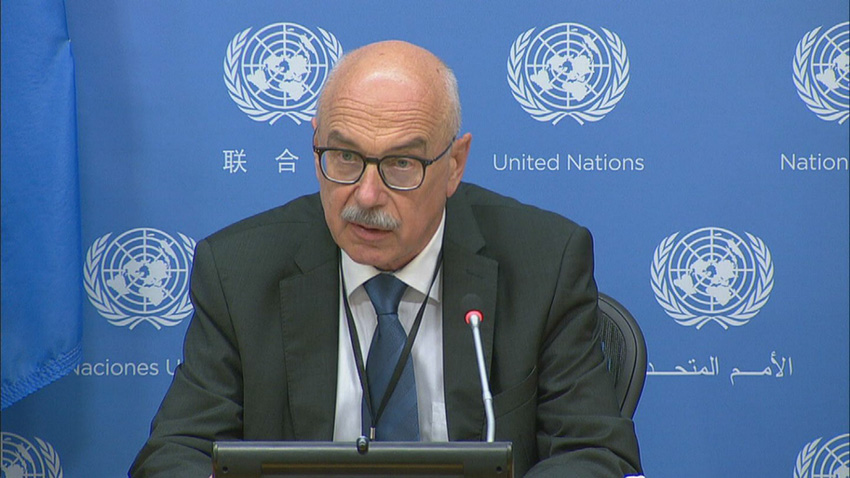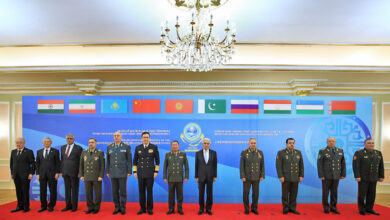Call for action to combat terrorism on International Day
Countries should work together to achieve a world “in which the promise of a future without terrorism shines for all”: Vladimir Voronkov
By R. Anil Kumar
-
On 12 February 2024, the United Nations will commemorate the second International Day for the Prevention of Violent Extremism as and when Conducive to Terrorism through a series of events and activities
-
Today and every day, let us work together to build more peaceful, inclusive, and stable societies in which terror and violent extremism have no home António Guterres
-
“Despite years of counter-terrorism efforts, violent extremists continue to exploit instability and conflict to undermine trust and foment division, destroying the social fabric of communities, and challenging the UN’s values of peace, justice, and human dignity,” Vladimir Voronkov
UNITED NATIONS, February 13. The head of the UN Office of Counter-Terrorism (UNOCT) has stressed the need for countries to work together to achieve a world “in which the promise of a future without terrorism shines for all”.

Vladimir Voronkov made the appeal in a video message to mark the second International Day for the Prevention of Violent Extremism as and when Conducive to Terrorism.
“Despite years of counter-terrorism efforts, violent extremists continue to exploit instability and conflict to undermine trust and foment division, destroying the social fabric of communities, and challenging the UN’s values of peace, justice, and human dignity,” he said.
Furthermore, the digital space provides a global platform to spread violent ideologies even further and faster.
Mr. Voronkov said the International Day provides an opportunity to highlight the commitment from Member States, the UN system and all relevant global partners to unite in common efforts against violent extremism.
He urged countries to “focus on implementing comprehensive approaches encompassing not only essential security measures, but more importantly than ever, systematic preventive steps to address the underlying conditions that drive individuals to join terrorist groups.”
The measures are in line with the UN Secretary-General’s 2016 Plan of Action to Prevent Violent Extremism.
Violent extremism is an affront to the purposes and principles of the United Nations. It undermines peace and security, human rights and sustainable development. No country or region is immune from its impacts.
Violent extremism is a diverse phenomenon, without clear definition. It is neither new nor exclusive to any region, nationality or system of belief. Nevertheless, in recent years, terrorist groups such as Islamic State in Iraq and the Levant (ISIL), Al-Qaida and Boko Haram have shaped our image of violent extremism and the debate on how to address this threat, Mr. Voronkov said.
These groups’ message of intolerance — , religious, cultural, social — has had drastic consequences for many regions of the world. Holding territory and using social media for real-time communication of their atrocious crimes, they seek to challenge our shared values of peace, justice and human dignity, he said.
The spread of violent extremism has further aggravated an already unprecedented humanitarian crisis which surpasses the boundaries of any one region. Millions of people have fled the territory controlled by terrorist and violent extremist groups. Migratory flows have increased both away, from, and towards the conflict zones – involving those seeking safety and those lured into the conflict as foreign terrorist fighters, further destabilizing the regions concerned, Mr. Voronkov added.
Nothing can justify violent extremism but we must also acknowledge that it does not arise in a vacuum. Narratives of grievance, actual or perceived injustice, promised empowerment and sweeping change become attractive where human rights are being violated, good governance is being ignored and aspirations are being crushed, Voronkov stated.
International Day for the Prevention of Violent Extremism as and when Conducive to Terrorism
In its resolution 77/243, the General Assembly decided to declare 12 February the International Day for the Prevention of Violent Extremism as and when Conducive to Terrorism, in order to raise awareness of the threats linked to violent extremism, as and when conducive to terrorism, and to enhance international cooperation in this regard.
The General Assembly emphasized in this context the primary responsibility of Member States and their respective national institutions in countering terrorism, and underlined the important role of intergovernmental organizations, civil society, academia, religious leaders and the media in countering terrorism and preventing violent extremism as and when conducive to terrorism.
The resolution reaffirmed that terrorism and violent extremism as and when conducive to terrorism cannot and should not be associated with any religion, nationality, civilization or ethnic group.
The General Assembly invited the Office of Counter-Terrorism, in collaboration with other relevant entities of the United Nations Global Counter-Terrorism Coordination Compact, to facilitate the observance of the International Day.
Plan of Action to Prevent Violent Extremism
On 15 January 2016 the Secretary-General presented a Plan of Action to Prevent Violent Extremism to the General Assembly. On 12 February 2016, the General Assembly adopted a resolution welcoming the initiative by the Secretary-General, and taking note of his Plan of Action to Prevent Violent Extremism.
The Plan of Action calls for a comprehensive approach encompassing not only essential security-based counter-terrorism measures but also systematic preventive steps to address the underlying conditions that drive individuals to radicalize and join violent extremist groups.
The Plan is an appeal for concerted action by the international community. It provides more than 70 recommendations to Member States and the United Nations System to prevent the further spread of violent extremism.





